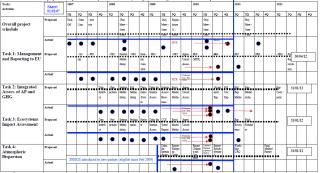The EC4MACS work plan

The EC4MACS project, co-financed by the LIFE program, extends from 2007 to 2013. It includes the following main work elements:
- Update models, where necessary, to incorporate new scientific insights
- Scientific peer review of all models
- Improve model interfaces
- Validate input data with stakeholders
- Produce interim assessment in 2009
- Produce final assessment in 2011/12
Description of tasks
The project will build and maintain a network of well established modelling tools for a comprehensive integrated assessment of the policy effectiveness of emission control strategies for air pollutants and greenhouse gases. The common assessment framework (GAINS) will link the RAINS integrated assessment model for air pollution, the PRIMES energy model, the TREMOVE transport model, the CAPRI agriculture model, the EMEP atmospheric dispersion model, the GAINS-Europe model for greenhouse gas mitigation, models for health and ecosystems impacts, the GEM-E3 macro-economic general equilibrium model and the Beta and Externe benefit assessment approaches. All these models have been successfully applied in earlier policy processes (i.a., the CAFE programme). Their combined analytical capacity will be extended by a newly developed model for carbon sinks (EU-FASOM), which will then allow an integrated assessment of mitigation and enhanced carbon sinks across sectors and pollutants.
The current databases of all models will be updated to reflect latest perspectives on energy demand and agricultural production in the EU up to 2030 to be consistent with relevant energy, transport, and agricultural policies as well as with environmental legislation including commitments under the Kyoto Protocol and subsequent climate obligations. Model descriptions of key processes will be improved to reflect new scientific findings, e.g., on health, ecosystems impacts, biodiversity and atmospheric chemistry and to reach a more accurate description of urban pollution levels. The technical and economic description of emission sources and abatement technologies for air pollutants and greenhouse gases will be updated and the analysis of non-technical measures will be introduced. Databases will be validated in consultations with stakeholders from Member States and industry.
With these improvements, the GAINS model framework will be used to for a comprehensive assessment of the costs, impacts and benefits of policies on air pollution and climate change. The project will develop a baseline projection of future emissions and air quality impacts that can be expected from a full implementation of the EU legislation in the coming years. Against this baseline, it will explore policy options for cost-effective further improvements of air quality and greenhouse gas emissions and assess their costs, benefits, macro-economic impacts for all economic sectors and Member States. Analysis will include all European countries and extend to the year 2030. It will cover all European countries (including the European part of Russia), and include emissions of air pollutants (SO2 , NOx , VOC, NH3 , PM) as well as the greenhouse gases CO2 , CH4 , N2O , CFCs, HFC, SF6 . The analysis will pay specific attention on the physical and economic interactions between greenhouse gas mitigation and air pollution control. It will address health impacts from fine particulate matter and ozone, vegetation damage from ozone, and acidification and eutrophication of ecosystems. New elements will compile specific estimates for the Natura2000 nature protection areas and develop indicators for threats to biodiversity.
The central analytical tool (i.e., the GAINS model) will be made available to the general public on the Internet, so that stakeholders and citizens can increase their confidence into the scientific and technical analyses by conducting their own assessments.
The project will produce an interim assessment in 2007/2008, and a final assessment in time for the review of the Thematic Strategy on Air Pollution and the analyses of the European Climate Change programme for the post-2012 period.